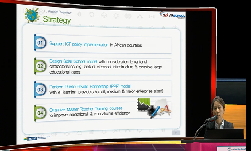There is a gap in the literature regarding factors relevant to help-seeking among students from racial and ethnic backgrounds who attend universities where they are in the minority (Heppner, Witty, & Dixon, 2004). This dissertation study attempted to...
http://chineseinput.net/에서 pinyin(병음)방식으로 중국어를 변환할 수 있습니다.
변환된 중국어를 복사하여 사용하시면 됩니다.
- 中文 을 입력하시려면 zhongwen을 입력하시고 space를누르시면됩니다.
- 北京 을 입력하시려면 beijing을 입력하시고 space를 누르시면 됩니다.
https://www.riss.kr/link?id=T10604004
- 저자
-
발행사항
[S.l.]: City University of New York 2005
-
학위수여대학
City University of New York
-
수여연도
2005
-
작성언어
영어
- 주제어
-
학위
Ph.D.
-
페이지수
134 p.
-
지도교수/심사위원
Adviser: Georgiana Shick Tryon.
-
0
상세조회 -
0
다운로드
소속기관이 구독 중이 아닌 경우 오후 4시부터 익일 오전 9시까지 원문보기가 가능합니다.
부가정보
다국어 초록 (Multilingual Abstract)
There is a gap in the literature regarding factors relevant to help-seeking among students from racial and ethnic backgrounds who attend universities where they are in the minority (Heppner, Witty, & Dixon, 2004). This dissertation study attempted to address this gap by focusing on the counseling expectations of 102 first-year African American, Hispanic, and biracial students (mean age = 18.55 years; 83 females, 19 males) who participated in an Opportunity Program on their universities campus.
The purpose of this study was to investigate the extent to which counseling expectations, as measured by Tinsley's (1982) Expectations About Counseling-Brief Form (EAC-B), were predicted by three individual characteristics---self-esteem, as measured by the Rosenberg Self-Esteem Scale (RSE; Rosenberg, 1965); attributional style, as measured by the Children's Attributional Style Questionnaire-Revised (CASQ-R; Thompson, Kaslow, Weiss, & Nolen-Hoeksema, 1998); and self-appraised problem-solving skills, as measured by the Problem Solving Inventory (PSI; Heppner & Petersen, 1982). A supplementary analysis examined whether background variables (SES, prior counseling experience, gender, cultural congruity, level of acculturation) moderated these relationships.
Ethnic society immersion, as measured by the Stephenson Multigroup Acculturation Scale (SMAS, Stephenson, 2000) emerged as an important moderator variable in the relationship between counseling expectations and individual characteristics. Lower self-esteem combined with higher degrees of ethnic society immersion contributed to lower overall counseling expectations and lower expectations for facilitative conditions and nurturance. A more depressive attributional style combined with higher degrees of ethnic society immersion contributed to lower overall counseling expectations and lower expectations for personal commitment. Regardless of ethnic society immersion, a more depressive attributional style contributed to lower expectations for facilitative conditions and nurturance. Finally, a more negative view of oneself as a problem-solver combined with higher degrees of ethnic society immersion contributed to higher expectations for counselor expertise.
분석정보
연관 공개강의(KOCW)
-

Education Policy at the Party Conferences
Teachers TV Teachers TV -

Alcohol Education: Here's What We Want
Teachers TV Teachers TV -

Personal Finance Education: The Money Quiz
Teachers TV Teachers TV -

Early Sex Education: The Debate
Teachers TV Teachers TV -

2014 이러닝 국제 콘퍼런스 : What is the Lessons from Education Support Project~
한국교육정보진흥협회 Boseon, Kim






